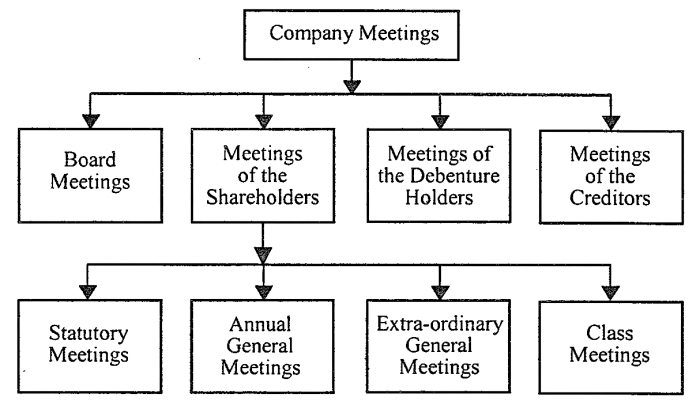Company Meetings | Essentials | Kinds of Company Meetings
Table of Contents
What is a Meeting?
In common parlance, the word meeting means an act of coming face to face, coming in company or coming together.

The Oxford Dictionary defines a meeting as
An assembly of number of people for entertainment, discussion or the like.
A meeting therefore, can be defined as a lawful association, or assembly of two or more persons by previous notice for transacting some business. The meeting must be validly summoned and convened. Such gatherings of the members of companies are known as company meetings.
Essentials of Company Meetings
The essential requirements of a company meeting can be summed up as follows:
1. Two or More Persons: To constitute a valid meeting, there must be two or more persons. However, the articles of association may provide for a larger number of persons to constitute a valid quorum.
2. Lawful Assembly: The gathering must be for conducting a lawful business. An unlawful assembly shall not be a meeting in the eye of law.
3. Previous Notice: Previous notice is a condition precedent for a valid meeting. A meeting, which is purely accidental and not summoned after a due notice, is not at all a valid meeting in the eye of law.
4. To Transact a Business: The purpose of the meeting is to transact a business. If the meeting has no definite object or summoned without any predetermined object, it is not a valid meeting. Some business should be transacted in the meeting but no decision need be arrived in such meeting.
Kinds of Company Meetings
The meetings of a company can be broadly classified into four kinds.
1. Meetings of the Shareholders.
2. Meetings of the Board of Directors and their Committees.
3. Meetings of the Debenture Holders.
4. Meetings of the Creditors.
The meetings of the shareholders can be further classified into four kinds namely,
- Statutory Meeting,
- Annual General Meeting,
- Extraordinary General Meeting, and
- Class Meeting.
The chart given below gives a classification of company meetings.
1. Statutory Meeting
This is the first meeting of the shareholders conducted after the commencement of the business of a public company. Companies Act provides that every public company limited by shares or limited by guarantee and having a share capital should hold a meeting of the shareholders within 6 months but not earlier than one month from the date of commencement of business of the company.
Usually, the statutory meeting is the first general meeting of the company. It is conducted only once in the lifetime of the company. A private company or a public company having no share capital need not conduct a statutory meeting.

2. Annual General Meeting
The Annual General Meeting is one of the important meetings of a company. It is usually held once in a year. AGM should be conducted by both private and public ltd companies whether limited by shares or by guarantee; having or not having a share capital. As the name suggests, the meeting is to be held annually to transact the ordinary business of the company.
3. Extra-ordinary General Meetings (EOGM)
Statutory Meeting and Annual General Meetings are called the ordinary meetings of a company. All other general meetings other than these two are called Extraordinary General Meetings. As the very name suggests, these meetings are convened to deal with all the extraordinary matters, which fall outside the usual business of the Annual General Meetings.
EOGMs are generally called for transacting some urgent or special business, which cannot be postponed till the next Annual General Meeting. Every business transacted at these meetings is called Special Business.
Persons Authorized to Convene the Meeting
The following persons are authorized to convene an extraordinary general meeting.
- The Board of Directors.
- The Requisitionists.
- The National Company Law Tribunal.
- Any Director or any two Members.
4. Class Meetings
Class meetings are those meetings, which are held by the shareholders of a particular class of shares e.g. preference shareholders or debenture holders.
Class meetings are generally conducted when it is proposed to alter, vary or affect the rights of a particular class of shareholders. Thus, for effecting such changes it is necessary that a separate meeting of the holders of those shares is to be held and the matter is to be approved at the meeting by a special resolution.
For example, for cancelling the arrears of dividends on cumulative preference shares, it is necessary to call for a meeting of such shareholders and pass a resolution as required by Companies Act. In case of such a class meeting, the holders of other class of shares have no right to attend and vote.
2. Meetings of the Directors
Meetings of directors are called Board Meetings. These are the most important as well as the most frequently held meetings of the company. It is only at these meetings that all important matters relating to the company and its policies are discussed and decided upon.
Since the administration of the company lies in the hands of the Board, it should meet frequently for the proper conduct of the business of the company. The Companies Act therefore gives wide discretion to the directors to frame rules and regulations regarding the holding and conduct of Board meetings.
The directors of most companies frame rules concerning how, where and when they shall meet and how their meetings would be regulated. These rules are commonly known as Standing Orders.
3. Meetings of Debenture Holders
The debenture holders of a particular class conduct these meeting. They are generally conducted when the company wants to vary the terms of security or to modify their rights or to vary the rate of interest payable etc. Rules and Regulations regarding the holding of the meetings of the debenture holders are either entered in the Trust Deed or endorsed on the Debenture Bond so that they are binding upon the holders of debentures and upon the company.
4. Meetings of the Creditors
Strictly speaking, these are not meetings of a company. They are held when the company proposes to make a scheme of arrangements with its creditors. Companies like individuals may sometimes find it necessary to compromise or make some arrangements with their creditors, In these circumstances, a meeting of the creditors is necessary.

Very helpful information about Company meetings and its kinds.
This is very useful information thnx sir by this information I got good marks in sectrial practices
This is very good information.The language is very easy to understand.Thnx for this